
|
Vol 74 |
Page 12 |
Privacy Policy | Editorial Policy | Profit Policy | Join the Association | List of Members | Contact us | Index | Links
Back Go to page: 1 2 3 4 5 6 7 8 9 10 11 12 13 14 15 16 17 18 19 20 Forward
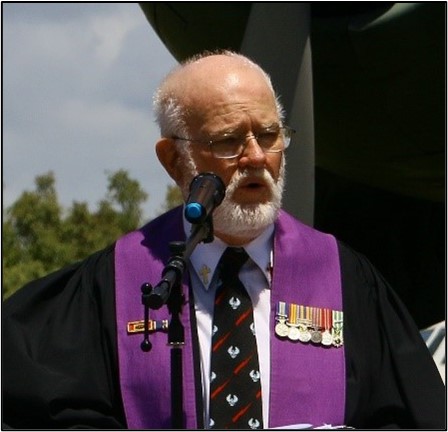
Arthur’s Articles.
Thirteen Months at 16 Army Light Aircraft Squadron.
After only three weeks into my marvellous ‘A’ Grade posting at 10 Squadron at Garbutt Air Base, Townsville, I arrived at 16 Army Light Aircraft Sqn (16 ALA) at RAAF Base, Amberley. The move was at my own expense as it was a condition of my exchange posting with a fellow Radio Technician course student, who had fallen at the last hurdle. I was about to begin a less than-exciting tour of duty after forfeiting such a great posting ahead of me that I had been looking forward to, but at Amberley I was only a short drive from my girlfriend, Annette, and I could spend nearly every night dropping into Ipswich to see her.
The downside of this exchange, was, as I was to find, I had numerous external attachments away from Amberley, so that while I did see Annette more than I would have if I had stayed at Townsville, time spent with her was far less than I had hoped for.
Another downside was that while my Sergeant in Townsville had promised to assist me in every way he could to send me back to finish my Radio Technician’s course, for he thought I had been given a raw deal in having my test sheet altered from ‘Supp Fail’ which meant I would have had another go to pass that phase, and the ‘S’ was erased and replaced with an ‘F’, - a Fail, which meant expulsion from Radio School.
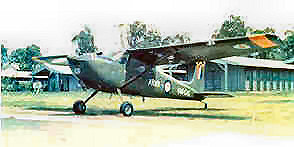
On the other hand, my Sergeant at 16 ALA was not so welcoming, as he had a small Radio Section, consisting of one Sergeant, one Corporal, two LAC Radio Technicians, and while he had wanted another LAC Radio Technician, he got me, a disgraced LAC Radio Mechanic. He would not allow me to work on expensive radio equipment in his section, and as he had to put one Radio Section member on the flight line, I became permanent ‘Duty Crew’ and was the first chosen to be sent on attachments wherever an aircraft came down without any flying bours left to make it back to Amberley.
Some highlights occurred to make this posting memorable. For a start, after arriving at 16 ALA in November 1963, Annette and I were engaged the next month. Then our separations began. I gleefully announced when in the section, but apparently overheard by my Sergeant, that Annette’s grandparents were celebrating their 60th wedding anniversary one Saturday in early 1964. Annette invited me to the family ceremony.
16 ALA, prior to becoming the Army Aviation Regiment and moved to Oakey, was a mixed Army - Air Force Unit at Amberley that flew Cessna 180 fixed wing aircraft and Bell Sioux rotary wing helicopters.
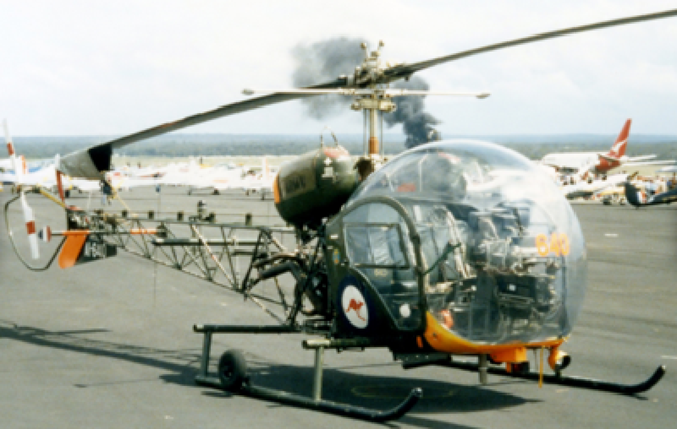
Bell Sioux
Just prior to Annette’s family festivity, word came in that a Bell Sioux helicopter working at St. George with Survey Corps, had run out of flying hours to return to Amberley for a scheduled servicing. You can guess who was sent out by road convoy to St George to perform the radio part of that servicing? Me!
That was immediately followed by a road convoy to Puckapunyal to exercise Sioux helicopters with tanks of the Armoured Regiment. You will never guess who was one of the two from Radio Section who was sent on that trip? Me! What? Fry allowed to work on radio equipment. No! Every day, I was taken out to Heathcote, west of Puckapunyal, where I pumped fuel from 44-gallon drums night and day to keep the choppers in the air for the duration of that exercise.
But that trip left me with one of my funniest stories from my time at 16 ALA. We left Amberley in convoy at 10 a.m. and managed to make it to Warwick before thirst struck the convoy commander and we pulled into an hotel in Warwick’s main street. We were a motley crew. The Army RAASC, (Service Corps, prior to becoming Royal Corps of Transport,) drivers wore light green flying suits with the Unit’s light blue berets. They wore the Unit’s patch, that of a Sioux Indian’s head in multiple colours on the top of their sleeve. Some Air Force members wore jungle green uniform with khaki shoulder flashes stating ‘’RAAF’. Some wore dark blue berets without insignia, some wore RAAF caps with airmen’s cap badges. As I say, we were a motley crew.
A clown in full clown regalia came into the bar and walked past the members of the convoy, to the end of the bar. He waited for about ten minutes without being served. He then called to the barman, “Don’t you serve everybody?” To which the barman replied, “Sorry Sir, I thought you were with this mob!” True story, and we laughed like mad.
The next forgettable non-radio event was on the Queen’s Birthday Public Holiday at Parliament House for the Queen’s Birthday Levy. Again, I was selected to be part of the contingent from 16 ALA to attend at Parliament House, on a designated Public Holiday, at the end of George Street. An ALA sergeant Air Frame Fitter and about six ground crew, (mainly Mechanics) arrived at Parliament House. The Sergeant and two LACs went up to the flag platform on the roof of Parliament House to raise the Governor’s Standard when he was in the Parliament. The Governor, Colonel Sir Henry Abel-Smith, arrived at Parliament House, removed his cap to go into the Levy. His cap and those of his equerry and other military members in his party, were locked into a cupboard and the key handed to one of the 16 ALA party who had no other task to stand around and look official.
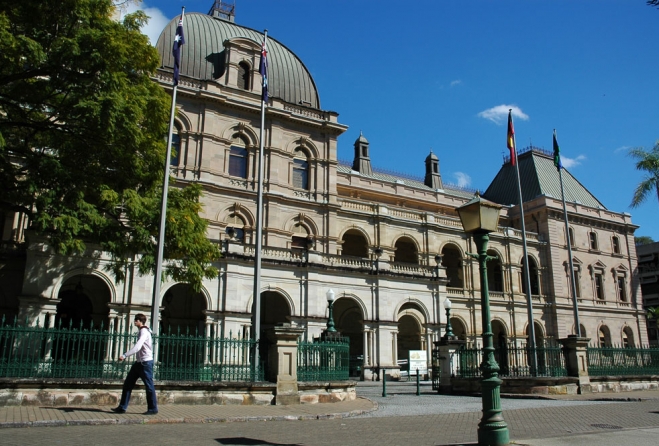
Queensland’s Parliament House.
Four of us who held or protected the one with the key, asked an official how long the Levy should last. “Usually about two hours,” we were told. So, the four of us decided to go for a walk around Brisbane seeing that we were not wanted for any other duties. As we left the building, the last thing we noticed was the Sergeant madly waving his arms at the flagpole stand on the roof of Parliament Hose. So, we just waved back politely to him. Now we know that he was gesticulating to tell us to stay put at Parliament House.
In due time we headed back towards Parliament House when we saw a police motorcycle escort, followed by Colonel, Sir Henry Abel-Smith’s Rolls Royce approaching. Sir Henry had his cap on. We sheepishly crept back and handed in that key. (They must have had a spare key.) When the Sergeant came down from the roof to the lobby, we received our first bawling out for deserting our post. When we returned to Amberley, we received our second bawling out from the RSM. 16 ALA was part Army, part Air Force. In fact, we used to say that the Army owned the aircraft, the Army Flew them, the Army busted them, the Air Force fixed them. (For those who know the full terminology, please do not write in with the correction!) Another slice of terminology was that the Unit was known as TWA, but unlike the larger American airline, this ‘TWA’ stood for ‘Teeny Weeny Airlines’.
My punishment for locking the Governor’s cap in a cupboard then disappearing with the key, was six weeks weekend Duty Crew, so for the next six weeks, I was on Duty Crew for seven days a week! That meant doing pre-flights on every aircraft. Guiding every aircraft in and out of the flight line and taking my turn in pumping fuel if the tanker was not available. Will I always remember Queens Birthday Levy 1964? You bet’cha!
But the one trip that really concreted my Sergeant’s dislike for me was the one to Jervis Bay for Exercise Long Shot. Although my Sergeant did not want me touching precious Army equipment in his Radio Section, he chose me to drive the Radio Studebaker truck, (much more valuable, you say?) down to HMAS Albatross, that is the Nowra Naval Station, Jervis Bay Territory, of the A.C.T.
I was sent down to the Army Driving Licence tester in the RAAF Transport Section to gain my G11 A, a temporary Army Driving Licence to enable me to drive the huge Studebaker Van with all its precious and expensive equipment to Nowra. I received my G 11A and I must say, the Studebaker did not feel like a truck, more a kind of sports car. I enjoyed the experience.
At the end of the exercise, I approached my Sergeant and told him the bad news that when issued, the tester did not realize that the exercise would finish after my G 11 A expired! My Sergeant and I debated the matter of driving without a current driver’s licence. Playing the card that I did not want to get into further trouble, I would not drive unlicenced. He thought I should and that it did not matter if my G11 A had expired or not. The alternative was for him to drive. My alternative was to go home by troop train which would leave from Nowra and arrive in South Brisbane two days ahead of the convoy. I came home on the troop train! The relationship between my Sergeant and me sunk to a further low.
Another great memory of my time at HMAS Albatross was when a group of ‘Red Caps’, (Colonels and Brigadiers,) came to our site to watch how quickly we could launch an aircraft in an emergency. Lieutenant Barry Donald was to be the ‘Duty Pilot’. (Sadly, Barry was killed when a Pilatus Porter was shot at and crashed on a night sortie in Vietnam on the 6th of December 1969. I had the honour of officiating at his 50-years Memorial service when his daughter, then a Lieutenant Commander in the RAN, attended from HMAS Leeuwin in Western Australia.)
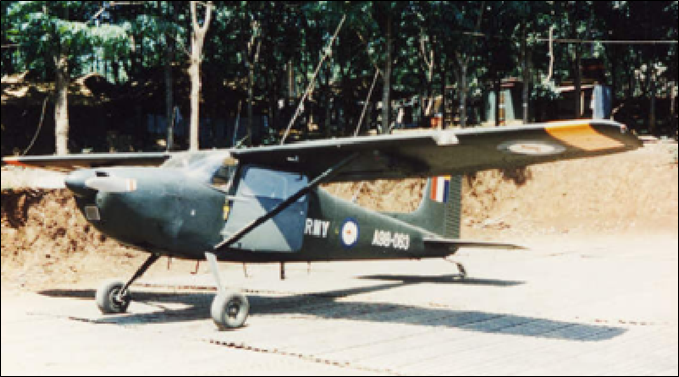
Cessna 180.
For days before the ‘Red Caps’ came to watch this highlight of our attendance in this Exercise, we practised the extraction from the ‘hide’ where we kept the aircraft from the peering eyes of the ‘enemy’, on that occasion, our own RAAF Canberra bombers. Barry would call out “Duty Crew, Scramble 042”. Quickly, all Duty Crew would appear from behind the trees that disguised their location.
“Sah!” (read ‘Sir!’) Then each would run to the Cessna fixed wing - 042 and each ‘did their thing’ The camouflage was removed, followed by one who removed the wheel chocks; the Cessna was pushed forward, and I connected the HF aerial from the end of the wing tip to the tail. The one who guided the pilot took his place at the front right of the aircraft and gave the ‘thumbs up’ and bellowed ‘Clear to start’.
Barry hit the starter……. R – R – R – R,….. No start! There was a mad dash to locate a battery cart which was then plugged into the Cessna, and the engine started. Barry taxied it out of the ‘hide’ for a few yards. The Duty Crew got into a huddle and laughed for about ten minutes. Once Barry had shut down the engine, he came over and joined us and joined in the laughter. What a fiasco? We had practiced that display for days, but we never went as far as actually starting the engine.
I also remember that exercise by flying with others who enjoyed doing that work as an observer, looking for signs of enemy movement at dawn and dusk. It involved diving down if the pilot thought he noticed troop movement, for an RAR Company would be the enemy looking for us, and our job was to locate and advise the position of such enemy. At the end of every sortie, we would buzz the Aircraft Carrier, HMAS Sydney, which was at anchor in Jervis Bay.
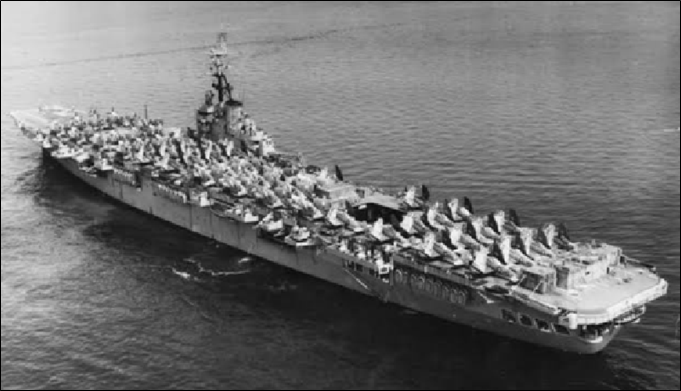
HMAS Sydney
Although we were RAAF, we had to dig bunkers around our site. Before we finished them off with overhead cover, we used to gather pinecones, prolific in the area and store them in our bunker. We amused ourselves while we sat in our bunkers at dawn and dusk, by lobbing pinecones, willy nilly, in the area. Occasionally we would hear a dull ‘ting’ when we hit a fellow RAAF member on the outer of his tin helmet, as we had to wear an inner and outer as a two-piece helmet while in the pit and while moving around the area. Later when we finalized our bunker, this game could not allow us to toss our pinecones.
One night, word had come to use the alternate password. Two ALA Officers had approached our pit area when the closest pit challenged them with “Stand”, As he received no reply, he shot the approaching officer - with a blank! The ALA officer asked what the shooter thought he was doing. The troop replied that he did not answer the challenge with the expected response - ‘By’. The officer roared back, “You idiot, you were told to use the standby password, not use the stand by pass word as “Pass’ and expect the response as “By”. (How do I know this yarn is true?)
My last memory of 16 ALA is when the RAAF called for applications to undergo language training at Point Cook for languages courses in 1965. The Sergeant said that no one else in the section is to apply for the aptitude testing in Brisbane for two days as the Corporal and he had applied for the aptitude testing and that would leave the radio section with only three bodies for two days. I had a good success with languages at High School, having studied French and Latin. I applied for the language aptitude testing in Brisbane.
After the tests, we went in one by one, to receive our results. We stood together although the Sergeant never spoke with me. The Sergeant asked the Corporal how he went. The Corporal replied that he did OK but because he was in a restricted mustering, he did not expect to be offered a position. He asked the Sergeant how he went. He shyly admitted he never made it. Then the Corporal asked me how I went. I glowingly replied, “I am on the course next year!” (At this stage, I was pleased I had read Dale Carnegie’s famous book, “How to win friends and influence people”!)
Weeks went on and one day, I was called around to the Orderly Room, to be told I had my posting, for the following January. I thought it was back to Radio School to finish my technician’s course. I made the comment that I knew that was inevitable and this time I will keep my big mouth shut. The Orderly Room Clerk corrected my line of thought and advised that I was posted to the RAAF School of Languages to undertake a twelve-month course in the Vietnamese language.
That night, I went into Ipswich and announced my anticipated removal from Amberley and on to Point Cook to learn Vietnamese. Then as we watched television, the News brought to our attention that there had been a war going on in Vietnam for four years.
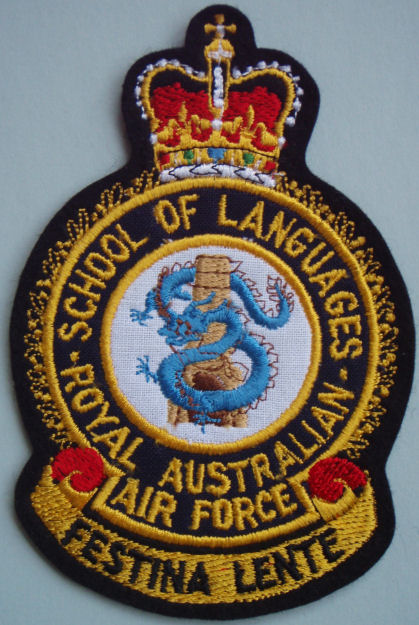
I later learned that as it was a live-in’ course, I could not take leave in the February to be married as we had planned to do. After a bit of negotiation, Annette’s mother agreed to let us marry on 19th December 1964. My roommate and fellow member of Radio Section, 16 ALA, Anthony (Mario) Lanza, was my groomsman.
Instrument section was next to Radio section. LAC, (later Flight Lieutenant) Rod Shepherd told me his younger brother, Clive, was also leaving his Artillery Unit to go to Language School in 1965 to study Indonesian and asked me to look out for his little brother. We did. We became great friends. He married into my family. We retired to South East Queensland, living two hours from each other, and we have been friends ever since we met on Day One at Language School.
One final thought on 16 ALA. Trainee helicopter pilots had a segment to perform the transport of injured troops on litters attached to the helicopter by two locking pins. When pilots needed a ‘body’ to carry out this exercise, I always put up my hand. Sleeves buttoned down and glasses removed, I was strapped onto a litter, I reckon I have had no other thrill in my life like flying around Amberley and Ipswich strapped to the litter. When the Sioux banked to the right, I had nothing between me and Terra Firma, yet I could never get excited that this thrill could turn dangerous or even fatal. But when the helicopter banked left, I would be looking down on the helicopter – from the outside! I was a little scared, yet I could never work out why. When doing an auto rotation where the helicopter landed on bitumen and ran along on its skids, I was lying face down just above a shower of sparks. Great fun!
When I would go in to see Annette that night I had played ‘patient-on-a-litter, and I was so excited about my daredevil working day, she relegated me to the inmate section of Wolston Park, or Goodna to those that remember what Brisbane’s main Mental Hospital was.
As my time at 16 ALA ended, I had mixed emotions. I had been able to see Annette more regularly than had I remained in Townsville. I made many friends at ALA, some of whom I am still in contact with today. I had a lot of fun times but on the other hand, I suffered many sadder occasions due to the indignities that saw my premature ‘graduation’ from Radio School.
But better days were on the horizon, and had all these ups and downs not happened, I would not have been sitting in a classroom at the School of Languages in 1965 which was the start of a wonderful career which I had never imagined as possible when I (foolishly and unwisely) stood up to a popular teacher at Radio School. What is the saying? ‘All things work together for good………….’
Walk with me as I embark on this fantastic career in future editions.
Impressive People I Met in My Air Force Career
Normally, I have mentioned uniformed members of the RAAF under this topic, but in this edition, I have chosen a man who became my friend as a visiting lecturer to the pilot cadets undergoing their basic introductory and basic flying training at Number One Flying Training School at Point Cook.
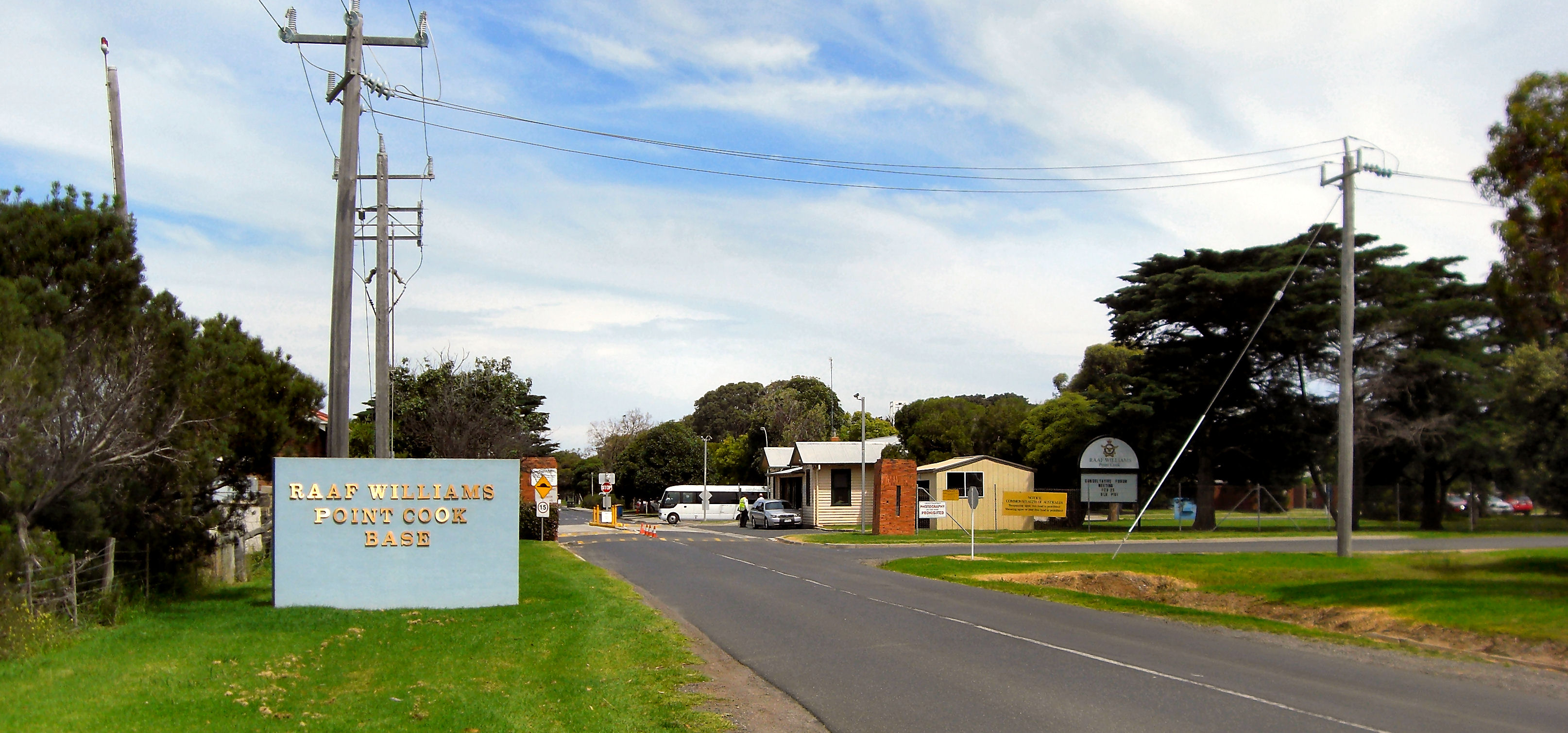
Entrance to Point Cook.
In the late 1970's. I was the Admin and Law Instructor, (I point out I am not a Lawyer,) but had shown an interest in Air Force Law. In fact, while on course at Officer Training School, the Commanding Officer, Wing Commander Norm Ashworth excused me from the course for a week to investigate the injuries suffered by two OTS students, injured in a car accident on the Laverton-Point Cook road.
One of my supernumerary positions after graduating from OTS, the secondary task where I spent most of my time, was as OIC Base Police, and likewise with my pseudo–Air Force Law post, I was not a trained policeman, although I worked with the Service Police as an Interpreter in Phan Rang and Vung Tau.
My apparent interest in Air Force Law also saw me attend every Court Martial held at Point Cook, either as the Officer Assisting the Prosecuting Officer or Officer Assisting the Defence Officer, but not at the same Court Martial! At 1 FTS, my other task was to prepare the weekly (Ground) program. Over the years, local businessmen were invited to present a lecture to the Cadets and Midshipman students on their specialty profession.
One such lecture was shared between two visitors from the financial planning industry so that students would be able to make informed decisions about disposal of their higher rate of pay upon graduation at RAAF Base Pearce.
One gentleman regularly 'got my goat' which was in the days before white boards, he would use wet chalk to write his name and that of his company on the black board. As the students entered the classroom, a blank black board would slowly reveal his message as he began his lecture. He never knew how difficult it was for me to erase dried formerly wet chalk from the surface of the blackboard.
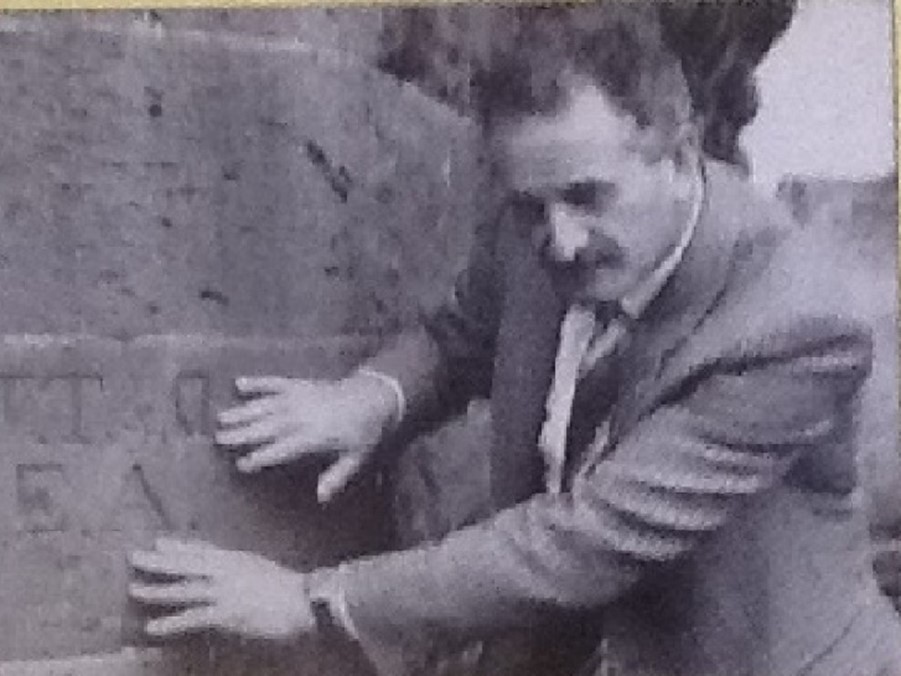
But the other gentleman lecturing on that topic shared many interests with me. We were both long distance runners although we never ran together. We were also both budding authors. And we became friends, while I was at 1 FTS, while I remained in the RAAF, and after my move to civilian life.
Rino Baggio
I speak of Rino Baggio, still a resident of Werribee where he lives with his wife, Helen. In my retirement from the RAAF, every time I visited Melbourne, Rino and I would slowly rock on his bench seat swing in his back yard, and as our wives said, 'solving the problems of the world'! Or we would meet in the many Italian Restaurants in Lygon Street, Carlton.
Aside from the problems of the world, we discussed our athletic pursuits and interesting runs we had enjoyed. We spoke on the normally taboo topic of religion between folks from either end of the denominational spectrum, for his cousin, a Cardinal in Rome had twice been selected for the ballot for Pope.
Rino had run for a seat in the Upper House in Victoria. He needed supporters to hand out his how- to- vote cards on polling day. I volunteered my services, rounding up a group of 'believers in his cause', (Rino ran on Family Values' issues) We manned a polling booth in the back streets of Maribyrnong, handing out his 'how-to-vote’ cards. That night, I was Rino's nominated Scrutineer inside the then closed polling booth for the count. It was my first foray into politics.
While scrutineering, an Italian gentleman who had been handing out cards all day for Rino's opposition, said to me, "Rino a good bloke. He for family. I vote for him." I thought, ‘Why hand cards for Rino’s opposition if that is how you feel?’ Deciding that silence on that occasion was the better part of valour, I buttoned my lip!
In 1979, Rino published his book, 'The Shoe in my Cheese'. It is mainly a biography of his father's family who migrated from Padua in Italy before World War Two. The title came from an Italian story that as his father emigrated as a single young man, he worked and saved every penny to buy his farm at Little River. He ate very frugally all year but at Christmas, he allowed himself a little extra, a ‘shoe in his cheese’.
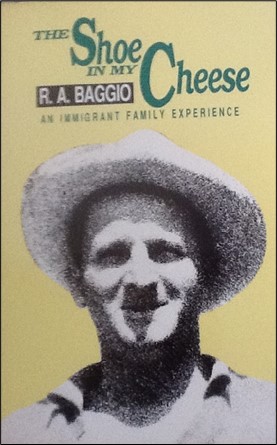
While researching the material for his book, he visited the family home region of Padua as well as cousin, Cardinal Baggio in Rome.
I cannot recall Rino ever calling me ‘Arthur’ after our initial introduction rather, he always referred to me affectionately as ‘Arturo’. Even in our recent verbal and written contact, Rino still calls me ‘Arturo’.
We all know what a great job Trevor has done over the years putting this revered magazine together. When Jeff Pedrina signed off on ’Pedro’s Patter’, Trevor offered me Page 12 that Jeff had written for years, I have come to appreciate Trevor’s sense of humour. Having told you Rino’s pet name for me, I half expect to see Page 12 renamed ‘Arturo’s Articles’.
One Christmas Day, we were the guests at the Baggio home in Werribee. He told of his parents’ tradition of drinking up to five small nips of Grappa every morning before going out into their vegetable farm on cold winter mornings. As it was time to leave the wonderful day we had enjoyed, Rino offered me just one small glass of Grappa. My wife had to drive home, and rumour has it that I could not even locate our Volvo sedan. I have never sipped Grappa since.
One sad footnote is that Rino's son, Marco, and our son, Ash, who were also friends and travelled to Chanel College, Geelong, by bus each school day, have sadly passed on. In remembrance of Marco, Rino went to Marco's wife's home, south of Shanghai, every year for eleven years to teach English as a Second Language.
I heard Rino had passed away in 2000, I investigated online, a saw a grave in Werribee for Rino Baggio whose family came from Padua in Italy. What a wonderful surprise it was recently when I received a phone call from Rino, who explained that it was his cousin who is buried in Werribee cemetery. His cousin and Rino were both named after their great uncle.
Perhaps some of our readers who passed through the ‘School of Knowledgeable’ portals at 1 FTS will remember visiting lecturer, Rino.
Although Rino was not a uniformed member of the RAAF, I certainly believe that he is eminently qualified to meet the criteria of this segment because Rino not only became a close friend respected member of the Point Cook / Werribee region, but was among those who influenced me during my RAAF career. Thank you Rino for being a great friend, and for not writing on my blackboard with wet chalk!
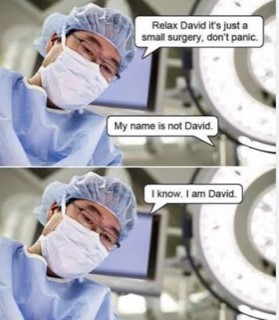
Back Go to page: 1 2 3 4 5 6 7 8 9 10 11 12 13 14 15 16 17 18 19 20 Forward